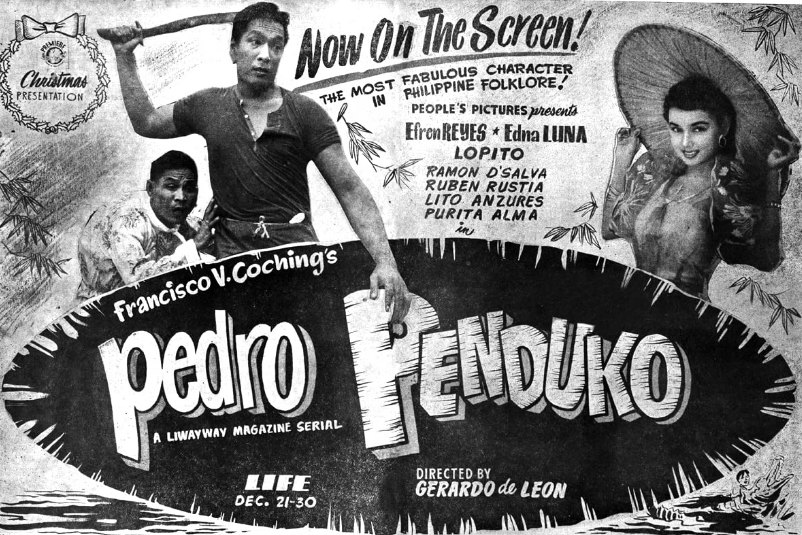The legend begins
Movie Review Pedro Penduko Directed by Gerardo “Gerry” de Leon LEGENDARY komiks writer-artist Francisco Coching’s most famous work first saw light of day in Liwayway Magazine; its first of many incarnations on the big screen was this, Gerardo...

Movie Review
Pedro Penduko
Directed by Gerardo “Gerry” de Leon
LEGENDARY komiks writer-artist Francisco Coching’s most famous work first saw light of day in Liwayway Magazine; its first of many incarnations on the big screen was this, Gerardo “Gerry” de Leon’s homespun folksy take done the same year (if web sources can be trusted).
Mr. De Leon is one of the few great filmmakers who dabbled in comics (others include — off the top of my head — Robert Altman, Mario Bava, Lino Brocka, Ishmael Bernal, Lamberto Avellana); the previous year he had also adapted Mars Ravelo’s Dyesebel, and while I generally agree with Martin Scorsese’s jab at Marvel Cinematic Universe amusement park rides, I do think some comic-book adaptations are cinema — you just have to decide which.
Mr. De Leon doing comedy can be jarring to watch; his better-known films are dramas (crime, period, melodrama) that move at a stately sometimes turgid pace, the feeling of monumental progress emphasized by his angled shots — the camera positioned so one figure looms over one corner of the screen while the other is dwarfed at the opposite end; the lenses poised a foot or more below the eyeline so everyone is granted larger-than-life stature. Comedy has this tendency to cut large figures down to size, so you wonder how Mr. De Leon would handle the potentially contrary genre.
Surprisingly well, as it turns out. Early scenes between Pedro (Efren Reyes) and the hunchbacked Terio (Lopito) have the loose-limbed feel of improvised dialogue; Tito Arevalo’s jaunty music helps establish a lighthearted tone. Mr. Reyes gives his Pedro the languid movements of a water buffalo; he strikes one as someone who can sprint when motivated (as by a collection of suman — glutinous rice cakes — hanging from an arm) but generally can’t be bothered to do anything, much less bathe. “Aren’t you embarrassed to be around women?” his disapproving mother asks. “What if they say your body is fit for planting taro?”
Women are drawn close despite Pedro’s sketchy personal hygiene — take Amparo (the fragile Edna Luna), a housemaid who admires Pedro but is shy to flirt with him because, 1.) she’s just not that kind of girl, and, 2.) she has a pronounced limp. Pedro doesn’t know she exists because he only has eyes for the newly arrived Marina, daughter of Kapitan (Captain) Julian (Ramon D’Salva); Marina is a bit of a shrew, but her tone softens around Pedro, who she likes despite (Because?) of his body odor.
Rounding out the daisy chain of longing is Terio, who’s in love with Amparo; as he reasons out, his crooked back wouldn’t turn off women so much if the women themselves had some kind of disability (hence his preference).
Terio loves Amparo loves Pedro loves Marina; for a comedy (Or because it’s a comedy?) no one is happy with the status quo. Marina at first glance seems the most open-minded; she invites Pedro to her dinners and dance parties. But she also insists on her status as upper-class diva, sometimes cutting Amparo’s yearning for Pedro, and her family (as with all rich families) harbors a hidden sin.
Amparo is all yearning; when she and Pedro lean against a haystack they exchange confessions, Pedro totally unaware she’s talking about him. Amparo admits to loving someone without expecting to be reciprocated. “What kind of love is that?!” Pedro asks. “You can’t explain love,” Amparo insists. “Love is love.” She shyly asks what he thinks of her. “I don’t have to worry around you,” he says thoughtlessly. “I don’t have to lie. Or dress up. Or even bathe. We’ve known each other since we were kids, do we have to pretend otherwise?” In those brief lines Pedro almost justifies his unclean self, that cleanliness or the lack of is a silly prejudice and a sign of insincerity and we shouldn’t hold ourselves prisoners to social convention. It’s such a clever argument I’m almost seduced.
Amparo isn’t; she hints that Pedro is taking too much for granted. Pedro, puzzled, asks what she means, gets no answer. In the film’s single most striking shot Amparo’s slim outline walks away, Pedro standing at the opposing end gazing thoughtfully at her, a lovely visual grace note to end a lovely scene.
It’s in these moments and not in the low comedy or singing (which sound dubbed) or action sequences to follow that I think the film’s true charm resides. Attractive performers lounging in hay, or leaning against a table or wall and confiding to each other — baring their souls in effect, risking dignity to offer the objects of their desire a clue (It’s me, can’t you see that?!).
Even better than Amparo doing a dance around the oblivious Pedro is Terio trying to prevaricate his way around Amparo — when Amparo confides to Terio that she wishes she could dance Terio tartly responds: “Don’t talk to me. Someday your limp might heal; when will my back straighten out?” Later he tells Amparo, “Don’t waste your tears on someone who doesn’t even know you exist. Lots of men are in love with you.” When Amparo presses him, Terio does the unexpected and lays his cards down, in my book the single bravest gesture in the film. Amparo looks at him with large lustrous eyes and I recognize that expression, the same look of recognition and faint disgust the formerly blind girl gave the Tramp at the end of City Lights. “Too bad Terio,” Amparo murmurs, “If only your feelings came out of Pedro’s heart…” and (again) walks away. Even in a folk tale where the impossible is often made possible, some things when all is said and done, are still not possible; the comic relief, no matter how funny or goodhearted or charming, does not get the girl when the reasonably handsome man is the star.
About an hour in the main plot kicks into gear: enter Tulisan Tirong (Ruben Rustia), a dark figure out of Kapitan Julian’s past. Where before the film has been gently needling the brittle conventions of Philippine society, now blades have been unsheathed; a man is shot, a maiden kidnapped, and Pedro must climb atop his trusty water buffalo, don the anting-anting — a vest with magical bulletproof runes written all over — his grandfather gave him, and ride to the rescue. The rest of the film, around 50 minutes long, isn’t unnecessary — it’s an escalation of tensions that have been simmering for the length of the first half — but it’s more familiar De Leon fare, if you’ve seen 48 Oras (48 Hours) or Sawa sa Lumang Simboryo (The Python in the Old Dome) or The Moises Padilla Story — somewhat leftist politics played out as action drama. Is Tirong in love with Amparo? He already has a mistress in Loretta — call her a comrade with benefits — but his fixation on Edna Luna’s character is inexplicable, and not a little unsettling.
Ride in the cavalry — to rescue or repress? Tirong is a surprisingly sympathetic villain, the constabulary surprisingly villainous — or surprising if you’re unfamiliar with De Leon’s filmography. Tirong might have stepped out of the pages of Jose Rizal’s Noli Me Tangere, an Elias figure bent on righting long-suffered wrongs; Pedro doesn’t counter him so much as right his own wrongs, basically the injustice he had done to Amparo.
Maybe the most startling moment comes when Pedro, staring down the barrel of a rifle, tears open his grandfather’s anting-anting and risks certain death — startling because everything we know or remember about the Pedro Penduko mythos is heavy on magic and fantasy, and the most fantastic moment in this film is Pedro’s encounter with a crocodile (an encounter Mr. De Leon restages to spectacular effect in his 1961 Noli Me Tangere); otherwise Mr. De Leon seems to be stripping away at the magic elements and saying “I don’t need that to tell an interesting story. Good writing, good acting, good filmmaking is all I really need.” He might be right, at that.


















